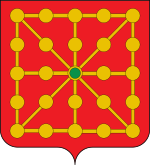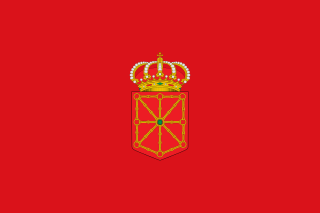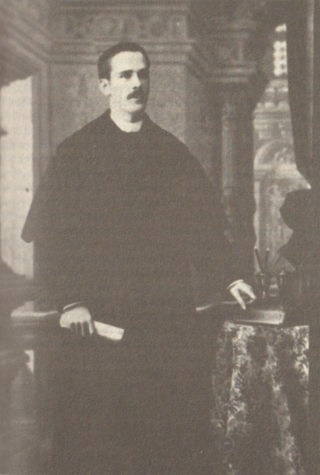
Navarrese nationalism is a political and social movement that claims Navarre to be a nation. [1]

Navarrese nationalism is a political and social movement that claims Navarre to be a nation. [1]
Navarrese nationalism was born out of independentist approaches to the reality of the region, different from the proposals of traditional Basque nationalist voices. [2] It wants to establish a sovereign state in Navarre, [3] and they see a historical precedent in the medieval Kingdom of Navarre; [1] or at least achieving a higher status for Navarre inside a hypothetically independent Basque Country, as they consider the ancient kingdom to be the founder of current Basque institutions. [4]
Even if it is a minoritary movement, it has trends within it. Some of their members are near the abertzale left, with a similar ideology to that of Basque separatism; [5] others are moderates, who want a more controlled and steady concession of sovereignty to Navarre; and there is also a sector identified with the political right. [6] The conservatives, after the promulgation of the Agreed Law (1841) and the dictatorship of Francisco Franco (1936-1978), are now defenders of foralism, rather than nationalism, [7] existing in the Basque Country a sector close to the ideals of the Basque Nationalist Party.
A 2005 survey found that only 36.8% of Navarrese residents reported a "predominant feeling of Navarrese national identity". [8] In 2019, another survey showed an increase to 52.16% in that same question. [9]

Navarre, officially the Chartered Community of Navarre, is a foral autonomous community and province in northern Spain, bordering the Basque Autonomous Community, La Rioja, and Aragon in Spain and Nouvelle-Aquitaine in France. The capital city is Pamplona. The present-day province makes up the majority of the territory of the medieval Kingdom of Navarre, a long-standing Pyrenean kingdom that occupied lands on both sides of the western Pyrenees, with its northernmost part, Lower Navarre, located in the southwest corner of France.

The Basque Nationalist Party, officially Basque National Party in English, is a Basque nationalist and regionalist political party. The party is Christian-democratic, with social-democratic and conservative-liberal factions. It operates in all the territories comprising the Basque Country: the Basque Autonomous Community and Navarre in Spain, and in the French Basque Country. It also has delegations in dozens of foreign nations, specifically those with a major presence of Basque immigrants.

The Basque Country is the name given to the home of the Basque people. The Basque country is located in the western Pyrenees, straddling the border between France and Spain on the coast of the Bay of Biscay. Euskal Herria is the oldest documented Basque name for the area they inhabit, dating from the 16th century.

Basque Workers' Solidarity is the most influential trade union in Basque Country, having been created, as Solidaridad de Obreros Vascos, by members of the Basque Nationalist Party on June 10, 1911, in Bilbao.

The Navarrese People's Union, abbreviated to UPN, is a regional conservative political party in Navarre, Spain. Until 2008, it was a fraternal party of the People's Party (PP), acting as the latter's Navarrese branch.

The Southern Basque Country is a term used to refer to the Basque territories within Spain as a unified whole.

Miren Uxue Barkos Berruezo, simply known as Uxue Barkos, is a Spanish journalist and politician who served as the President of Navarre from 2015 to 2019. She previously represented the Basque coalition Geroa Bai, and before that, Nafarroa Bai, in the Spanish Congress of Deputies.

EH Bildu, short for Euskal Herria Bildu is a left-wing, Basque nationalist, pro-independence political coalition active in the Spanish autonomous communities of Basque Country, Navarre and Burgos Province.

Eusko Alkartasuna is a Basque nationalist and social-democratic political party operating in Spain and France. The Basque language name means Basque Solidarity and abbreviated as EA. The party describes itself as a "Basque nationalist, democratic, popular, progressive and non-denominational party". Recently, the party adopted the slogan "Euskal Sozialdemokrazia".
Corruption in Navarre refers to a quick succession of corruption scandals which have come to light since 2012 referring to the UPN's tenure in office. However, amidst heated political confrontation since the late days of Franco's dictatorship, the first corruption cases erupted early on, going back to the first government cabinets formed after the establishment of Navarre's "Betterment".

Begoña Errazti is a Spanish politician. She is a leading member of the Basque Solidarity party, which is associated with Basque nationalism and Social democratic policies. In 2007 she resigned as the party's president.

In the Spanish public discourse the territory traditionally inhabited by the Basques was assigned a variety of names across the centuries. Terms used might have been almost identical, with hardly noticeable difference in content and connotation, or they could have varied enormously, also when consciously used one against another. The names used demonstrate changing perceptions of the area and until today the nomenclature employed could be battleground between partisans of different options.

The Carlist Party of Euskal Herria, before 2000 known as the Carlist Party of Euskadi, is a left-wing Carlist Basque political party with presence in the Spanish Basque Country. The party was historically part of the pro-Carlos Hugo wing of the Carlist movement. The party was not legalized until late 1977.

Maiorga Ramirez is a Basque nationalist politician. He is a leading member of the Eusko Alkartasuna (EA) in the province of Navarre and, since 2015, one of three just EA members of the Parliament of Navarre, where the EA sits as part of the EHB left-wing nationalist coalition.

Alejandro María Daniel Irujo Urra (1862-1911) was a Spanish lawyer. In popular discourse he is known as father of Manuel Irujo Ollo, a Basque political leader. In scholarly historiographic realm he is acknowledged mostly as defense attorney of Sabino Arana during his trials of 1896 and 1902. Politically Irujo is considered a typical case of an identity located in-between Carlism and emerging Spain's peripheral nationalisms, in this case the Basque one.

José Ángel Zubiaur Alegre (1918–2012) was a Spanish right-wing politician. Throughout most of his life he remained active as a Carlist militant and held some positions in the regional Navarrese party executive. In the 1970s he left the movement and contributed to birth of a Navarrista party, Unión del Pueblo Navarro. His career climaxed during the Cortes term in 1967–1971, when he strove to liberalize the regime and gained nationwide recognition. In 1948–1951 and 1983–1987 he served also in the regional Navarrese self-government.
Navarra Suma was an electoral alliance in Navarre formed by Navarrese People's Union (UPN), Citizens (Cs) and the People's Party (PP) ahead of the April 2019 Spanish general election and kept for the May 2019 local and regional elections. The goal of the three parties was to create a broad coalition of anti-nationalist centre-right forces in Navarre.

Amadeo Marco Ilincheta (1900-1987) was a Spanish Traditionalist politician, until 1942 active within the Carlist movement and afterwards in the Francoist structures. He is best known as the iconic Navarrese personality of the Franco era, principally as a longtime member of the regional self-government, Diputación Foral. He served as representative of the Aoiz-Sangüesa district in 1931 and then continuously during 6 successive terms in 1940–1979; during a few strings he was acting president of the Diputation. In 1943-1954 and in 1967-1977 he held a seat in the Francoist Cortes. In 1942-1954 he was member of the Falange Española Tradicionalista executive, Consejo Nacional. Since 1927 he intermittently served as the mayor of Navascués.
Sergio Sayas López is a Spanish politician who has served in the Congress of Deputies representing Navarre since the April 2019 election. Previously, he served in the Parliament of Navarre from 2007 to 2019. He was a member of the Navarrese People's Union (UPN) until his expulsion in 2022, after which he established the Navarre Platform (PN).